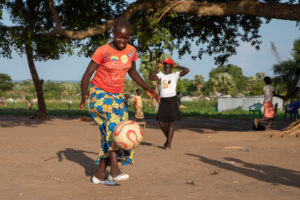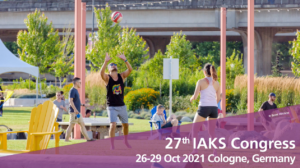
Collaboration between Fundacion Real Madrid and Millicom – TIGO for social sports projects in Latin America
Madrid, September 27, 2021 – Florentino Pérez has met with the CEO of Millicom|TIGO, Mauricio Ramos in Ciudad Real Madrid to sign the alliance […]





SandSI & World Athletics Join Forces to lead International Air Quality Working Group for sports industry
September 27th, 2021 – Sport and Sustainability International (SandSI) and World Athletics jointly announced today the creation of the Air Quality & Sport Working […]



Significant industry milestone in sustainable golf development
Second edition of the international voluntary sustainability standard for golf developments demonstrates golf’s continuing proactive leadership and progress in the construction industry. Developed through […]



FC Barcelona and UNICEF launch new research to improve sport for development delivery for children
BARCELONA, 21 September 2021 –The Barça Foundationand UNICEF today launched new research confirming that sport can have a powerful impact on children’s overall education and […]




Dutch and German companies work on artificial grass recycling solution
The Netherlands – Sport Group and GBN-AGR have signed a Letter of Intent (LOI) to collaborate on the development of artificial grass recycling infrastructure and technologies […]



The sports and leisure sector has been impacted massively by Covid-19, while we also need to respond to the challenge of climate change. Social, ecological and economical sustainability needs to be addressed in an integral way. Grass root and elite sport will face funding challenges for both public and private projects, as governments world-wide search for ways to recover from the pandemic.
Meet international experts sharing their experiences on making communities places of active living. Get to know best practice examples to tackle the challenges of climate change. Ecological, economic and social sustainability needs to be addressed in an integral way.
IAKS is proudly hosting the 27th edition of this outstanding knowledge sharing event.
Topics include :
- Addressing the global climate challenge
- Innovation to foster ecological sustainability
- Zeroing in on Net Zero
Click here to register

100 months…
That’s all the time we have until the 2030 deadline to meet the United Nations 17 Sustainable Development Goals. And that’s why SandSI is […]

Lay’s RePlay opens Leicester football pitch from upcycled crisp packets
In partnership with the UEFA Foundation for Children and NGO streetfootballworld, PepsiCo, a long-standing UEFA Champions League partner, has launched this global initiative to […]


Analysis: China’s green Winter Olympics 2022 to boost natural gas demand
China’s push to host a “green” 2022 Olympics and Paralympic Winter Games is expected to boost clean energy demand including natural gas consumption over […]


Sport Positive Summit
Global sport faces major disruption from climate change in coming decades. Across the world we are already seeing our athletes and the sports we love being impacted by the likes of flooded pitches, extreme heat, smoke from bush fires, coastal erosion and lack of snow for winter sports
No sport will be exempt from impact of climate change, and the time to act is now. Crucial early adopters have been working towards sport having a lower environmental footprint for decades, but a critical mass of sport properties globally are getting behind this effort right now thanks to the likes of UN Sports For Climate Action Framework and other initiatives. Sport has never been in a more powerful position to harness the zeitgeist to drive change that will safeguard its future, positively impact the world for generations to come, and evolve the sports business model towards a more sustainable economic foundation.
So what can you do?
- Join us at Sport Positive Virtual Summit 2021 to learn, discuss, network and connect with your global colleagues and be empowered to drive change
- Make an external commitment to playing your part: sign up to UN Sports for Climate Action Framework
- Understand what your impact is as an organisation; measure, benchmark, improve
- Put a plan in place to reduce your climate impact within your organisation, through your supply chain and via your sponsors
- Engage with your fans and community to make positive behavioural changes in their own lives
Click here to join us at Sport Positive Virtual Summit 2021.
